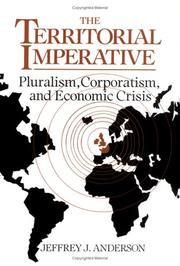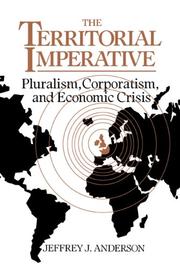| Listing 1 - 8 of 8 |
Sort by
|

ISBN: 0521413788 0521036097 0511664133 Year: 1992 Publisher: Cambridge : Cambridge University Press,
Abstract | Keywords | Export | Availability | Bookmark
 Loading...
Loading...Choose an application
- Reference Manager
- EndNote
- RefWorks (Direct export to RefWorks)
The Territorial Imperative explores an area of interest in comparative political economy - the interaction of politics and economics at the mesolevel of the polity. Noting the ubiquity of regional economic disparities within advanced industrial democracies, Jeffrey Anderson undertakes a sophisticated analysis of the complex political conflicts such disparities generate. In this study of political responses to regional crisis, the principal theoretical focus centres on the impact of constitutional orders as bona fide political institutions. On the basis of a carefully constructed comparison of four declining industrial regions within a broader cross-national comparison of unitary Britain and federal Germany, Anderson concludes that constitutional orders as institutions do in fact matter. The territorial distribution of power, encapsulated in the federal-unitary distinction of interests and resources among sub-national and national actors and on the strategies of cooperation and conflict available to them.
REGIONAL DISPARITIES -- 330.191.4 --- ECONOMIC CONDITIONS -- 330.191.4 --- Cultural pluralism --- Federal government --- Pluralism --- Regionalism --- Geografie --- Sociale geografie --- Politieke Geografie. --- Great Britain --- Germany (West) --- Economic conditions --- Regional disparities --- Politics and government --- Regional disparities. --- Politics and government. --- Social Sciences --- Political Science --- Culturalism pluralism --- Human geography --- Nationalism --- Interregionalism --- Federal Republic of Germany --- Germany (Federal Republic, 1949- ) --- GFR --- West Germany (1949-1990) --- Germanskai︠a︡ Federalʹnai︠a︡ Respublika --- Ḥukūmat Almānyā al-Ittiḥādīyah --- NRF --- Niemiecka Republika Federalna --- FRG --- Federativnai︠a︡ Respublika Germanii --- NSR --- Nĕmecká spolková republika --- Német Szövetségi Köztársaság --- BRD --- Bundesrepublik Deutschland --- Republiḳah ha-federalit ha-Germanit --- Batı Almanya --- Federal Almanya --- Tyske forbundsrepublik --- NSzK --- Repubblica federale tedesca --- Hsi-te cheng fu --- Te-i-chih lien pang kung ho kuo --- RFA --- République fédérale allemande --- RFN --- Republika Federalna Niemiec --- Republik Federasi Jerman --- Germany (Federal Republic) --- G.F.R. --- N.R.F. --- F.R.G. --- N.S.R. --- B.R.D. --- N.Sz.K. --- R.F.A. --- R.F.N. --- Alemania Federal --- République fédérale d'Allemagne --- República Federal de Alemania --- Bondsrepubliek Duitsland --- Repubblica federale di Germania --- German Federal Republic --- Western Germany --- Germany --- Germany (Territory under Allied occupation, 1945-1955) --- Germany (Territory under Allied occupation, 1945-1955 : British Zone) --- Germany (Territory under Allied occupation, 1945-1955 : French Zone) --- Germany (Territory under Allied occupation, 1945-1955 : Russian Zone) --- Germany (Territory under Allied occupation, 1945-1955 : U.S. Zone) --- Germany (East)

ISBN: 0847690245 0847690253 Year: 1999 Publisher: Lanham, Md Rowman and Littlefield
Abstract | Keywords | Export | Availability | Bookmark
 Loading...
Loading...Choose an application
- Reference Manager
- EndNote
- RefWorks (Direct export to RefWorks)
Democracy --- European federation. --- International economic integration. --- Democracy. --- Démocratie --- Construction européenne --- Intégration économique internationale --- European Union --- Europe --- Economic integration. --- Intégration économique --- Internationale economische integratie --- International relations. Foreign policy --- European Union countries --- Union européenne --- European federation --- Economic integration --- International economic integration

ISBN: 9780511664137 9780521413787 9780521036092 Year: 1992 Publisher: Cambridge Cambridge University Press
Abstract | Keywords | Export | Availability | Bookmark
 Loading...
Loading...Choose an application
- Reference Manager
- EndNote
- RefWorks (Direct export to RefWorks)
Book
ISBN: 9780857452214 Year: 2010 Publisher: New York (N.Y.) Berghahn
Abstract | Keywords | Export | Availability | Bookmark
 Loading...
Loading...Choose an application
- Reference Manager
- EndNote
- RefWorks (Direct export to RefWorks)
Book
ISBN: 1501701916 1501701924 Year: 2008 Publisher: Ithaca : Cornell University Press,
Abstract | Keywords | Export | Availability | Bookmark
 Loading...
Loading...Choose an application
- Reference Manager
- EndNote
- RefWorks (Direct export to RefWorks)
The past several years have seen strong disagreements between the U.S. government and many of its European allies. News accounts of these challenges focus on isolated incidents and points of contention. The End of the West? addresses some basic questions: Are we witnessing a deepening transatlantic rift, with wide-ranging consequences for the future of world order? Or are today's foreign-policy disagreements the equivalent of dinner-table squabbles? What harm, if any, have events since 9/11 done to the enduring relationships between the U.S. government and its European counterparts?The contributors to this volume, whose backgrounds range from political science and history to economics, law, and sociology, examine the "deep structure" of an order that was first imposed by the Allies in 1945 and has been a central feature of world politics ever since. Creatively and insightfully blending theory and evidence, the chapters in The End of the West? examine core structural features of the transatlantic order to determine whether current disagreements are minor and transient or catastrophic and permanent.
Europe --- United States --- Foreign relations --- Foreign relations
Book
ISBN: 9781501701924 1501701924 9781501701917 1501701916 9780801446399 0801446392 9780801474002 0801474000 Year: 2008 Publisher: Ithaca
Abstract | Keywords | Export | Availability | Bookmark
 Loading...
Loading...Choose an application
- Reference Manager
- EndNote
- RefWorks (Direct export to RefWorks)
The past several years have seen strong disagreements between the U.S. government and many of its European allies. News accounts of these challenges focus on isolated incidents and points of contention. The End of the West? addresses some basic questions: Are we witnessing a deepening transatlantic rift, with wide-ranging consequences for the future of world order? Or are today's foreign-policy disagreements the equivalent of dinner-table squabbles? What harm, if any, have events since 9/11 done to the enduring relationships between the U.S. government and its European counterparts?The contributors to this volume, whose backgrounds range from political science and history to economics, law, and sociology, examine the "deep structure" of an order that was first imposed by the Allies in 1945 and has been a central feature of world politics ever since. Creatively and insightfully blending theory and evidence, the chapters in The End of the West? examine core structural features of the transatlantic order to determine whether current disagreements are minor and transient or catastrophic and permanent.
Europe --- United States --- Foreign relations
Book

ISBN: 9781501731488 Year: 2018 Publisher: Ithaca, NY
Abstract | Keywords | Export | Availability | Bookmark
 Loading...
Loading...Choose an application
- Reference Manager
- EndNote
- RefWorks (Direct export to RefWorks)
Book

ISBN: 9780857458575 Year: 2010 Publisher: New York Oxford
Abstract | Keywords | Export | Availability | Bookmark
 Loading...
Loading...Choose an application
- Reference Manager
- EndNote
- RefWorks (Direct export to RefWorks)
| Listing 1 - 8 of 8 |
Sort by
|

 Search
Search Feedback
Feedback About UniCat
About UniCat  Help
Help News
News